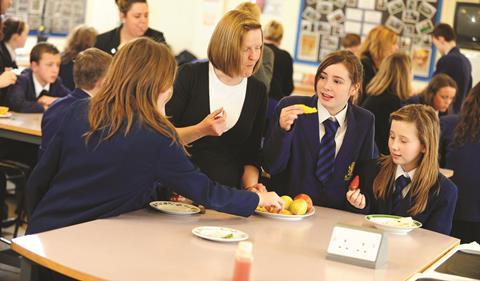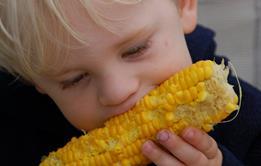Nutritional intervention can turn around troubled families’ lives and help them make better health decisions, explains Izzy Neale

TwentyTwenty is a charity that works with the most disadvantaged young people across Leicestershire. One of the projects I manage is called Love4Life, where every year we support hundreds of teenage girls through challenges such as sexual exploitation, caring responsibilities, overcrowded homes and poor emotional wellbeing.
‘Our intervention means that young parents can finally understand the importance of looking after their own bodies’
The reality of these “troubled families” is they are living in dire conditions, faced with caring for a child, struggling to pay their bills, and feeling like they are put under the microscope by professionals. They struggle to keep up with a world where everything is changing: new health initiatives, inflation of food prices and an increase in household bills.
These young people have no idea how to make healthy nutrition choices; they hear the phrase “healthy eating” and interpret this as simply “eating”. Their choices as parents have led to an increase in social services’ observations to determine whether they provide the right environment and the right nutrients for their child.
I recently worked with a young mum who thought feeding her child a Subway sandwich on a daily basis was a balanced diet. It contained meat, some form of salad, and looked healthy. She thought that if everyone was eating it, then surely it could not be that bad? As a result, her parenting was scrutinised, the child was taken into social care, and their future left in the balance.
Back to basics
From our experience based on the cycle of generational learning, we know that service providers have to go back to the basics to break the patterns and prevent situations like this happening.
‘Parents are in control, cycles are broken and new nutritional choices are made’
At Love4Life, we sit down and work out an individual budget plan with young parents, take them to their local supermarket and bring them into the kitchen. We get young parents used to being around fresh ingredients, showing them cheap and tasty alternatives so that they can see how far their money can go. We learn about their home environment, work with the appliances they have and show them how to transfer these skills into their own homes.
Our intervention means that young parents can finally understand the importance of looking after their own bodies. Once they can see the impact on how they feel, they can then transfer these skills onto their child. That feeling of being under scrutiny is no longer so strong because the young parents are in control. Cycles are broken and new nutritional choices are made.
For TwentyTwenty and Love4Life, supporting these troubled families means starting with understanding, and understanding their individual needs, their story and what they want for their family, so they feel empowered to make the right choices for themselves.
Case study: CCG and council work together to improve children’s health outcomes
Halton Clinical Commissioning Group and Halton Borough Council are committed to working together in an integrated way to improve health outcomes for children.
Dave Sweeney, director of transformation at the CCG and local authority, says an essential part of that integrated working is having a shared entity: in this case, the Halton Children’s Trust. The provider, established in 2008, is a partnership of public and voluntary sector organisations dedicated to working together to improve the health of local children.
‘There is little point dealing with a child unless you’re going to work with and support the family’
Mr Sweeney says: “All the key partners are part of the trust: the CCG, the probation service, the police, the local authority, the acute health trust, the foundation trust and the local mental health service provider. In many ways it almost mirrors the health and wellbeing board, but it is dedicated to children.
“From Halton [Borough Council]’s perspective, because of the integrated support through the children’s trust, CCGs, public health and children’s services have an aligned vision of what we want for children’s early life opportunities.
“We know our common ground and what we need to do. My opposite number at the local authority and I are setting key objectives aligning with both our plans, with particular emphasis on prevention. For example, weight management at a very early age means a reduction in obesity and therefore, a reduction in diabetes later in life.”
This structure has helped to overcome some of the gaps in services for children’s health, where even staff found it difficult to navigate health and social care systems, he says.
“Halton has a younger people’s obesity problem, but those numbers are starting to fall because of Halton’s whole system approach. I am positive that the full integration of public health into the local authority is key to this improvement.
“GPs were faced with children with problems. From a health perspective, the varied pathways made it very complicated about which service these children should go to.
“We created a tool to educate GPs across primary care and education services in terms of a simple explanation of psychological services for young people. Now we have a pathway where a child is picked up as early as possible and treated with a holistic approach. However, it has to be noted we still have work to do to make this totally efficient.”
This holistic approach means bringing together various services in order to meet children’s needs, including services for the parents of children in poor health.
“There is little point dealing with a child unless you’re going to work with and support the family,” says Mr Sweeney.
“We provide a huge amount of training in parents and guardians, such as through the nationally recognised and fully evidenced based positive behaviour service. This service provides emotional support for children and families. The courses it runs take the children through therapeutic development but the parents join in, through value based learning in de-escalation techniques and so on.”
Case study: locally led healthy cooking class helps reduce health inquality
An essential part of better public health is improving eating habits among the local population - at as early a stage as possible - to reduce instances in adults of diabetes, heart disease and other conditions associated with obesity, experts say.
Wiltshire Council director of public health Maggie Rae says the council’s work with Danone Nutricia Early Life Nutrition tackled healthy eating among young children, with an essential emphasis on educating parents.
The Healthy Eating for Young Children programme, run in Trowbridge, provided parents of children aged 1-3 years old with access to seven weekly, three hour sessions in which they learnt about cooking, food hygiene and shopping on a budget.
‘These problems can’t be solved by the Department for Communities and Local Government or the Department of Health’
The teaching itself was provided by Danone staff, in partnership with the Community Health and Learning Foundation, which promotes health learning to people with low basic skills, and the charity 4Children, which recruited participating parents and hosted the sessions.
Ms Rae says she initially had reservations about a private sector organisation providing this support, but was won over because Danone staff proposed to deliver the training to local parents on a voluntary basis.
“I actually had to learn a lot about the company and I discovered that we had some common ground, says Ms Rae. “It was quite clear that Danone was concerned about poor families being able to feed their children nutritiously. The predominant problem is that poor children are overweight in Wiltshire.”
She says parents were often prevented from learning or experimenting with cooking by themselves because of their low incomes.
Ms Rae says: “The reason people weren’t feeding themselves or their children the right things was often because they couldn’t cook. Electricity is very expensive; often parents are using card related electricity. If you cook something that doesn’t turn out properly, that’s a problem,” she says.
Ms Rae adds that parents often lack knowledge about the appropriate calorie intake for them and their children relative to their levels of exercise.
However, the project encouraged parents to learn essential cooking skills and about planning balanced, healthy meals in an environment where their mistakes would not cost them money, and they could share their experiences and learning with peers.
“Wonderful things happen when people are cooking together and eating together,” she says.
“You pick up all sorts of things in the conversation. People also enjoy it: most of us love food and enjoying food and getting involved in anything that’s food related.”
So far, 172 families have taken part in the project, ensuring they know what they must do to ensure their children lead healthy lifestyles.
Overall, Ms Rae says the project was successful because it is a locally tailored solution, and one which adheres to the council’s overarching health aims: to reduce health inequality and to make communities more resilient.
She believes these principles should drive public health activity more widely.
“These problems can’t be solved by the Department for Communities and Local Government or the Department of Health,” Ms Rae says.
“We need health visitors, GPs, councillors and families to get together to solve these problems.
“In Wiltshire we want to reduce health inequalities and have resilient communities that can take responsibility for their own health and wellbeing. If you get the principles right and you know where the most needy people are, you can support them to improve their own wellbeing and that of their children.”
Izzy Neale is support department manager of TwentyTwenty
Integration Summit: Early learning on nutrition

Why children’s nutritional needs are as important as their education
- 1
 Currently
reading
Currently
reading
Integration Summit: Family fortunes
- 3































No comments yet